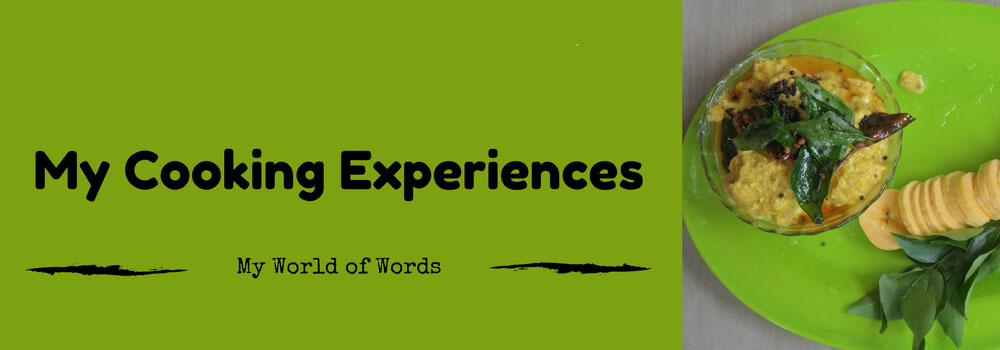Appam is a traditional breakfast dish associated with Kerala cuisine. Though it’s an integral part of Christian dishes of Kerala, all Keralities fondly accept it. Appam can be served with any side dish – either vegetarian or non-vegetarian, that’s the advantage. Though a breakfast dish, it can also be served with supper, and a good combo for chutney, vegetable stew, mutton stew etc.
 I have heard many people saying, “My appams are not good, my appams are not perfect”. I really can’t quote a reason behind it. No one told me a perfect recipe for appam, and I have learnt only through my experiences. I have my own ways of appam making, like others and would like to share a few simple tips with you.
I have heard many people saying, “My appams are not good, my appams are not perfect”. I really can’t quote a reason behind it. No one told me a perfect recipe for appam, and I have learnt only through my experiences. I have my own ways of appam making, like others and would like to share a few simple tips with you.
Useful tips for making Appam
1. Use only first quality raw rice (pachari) for making appam. It gives nice white colour and add taste to your appam.
2. Soak for at least 8 hours. For fermentation too, it will take at least 8 hours. It may vary up to 10 hours as per the activity of yeast used for appam making.
3. Yeast available from market or gulf countries may vary in its quality. New yeast takes less time for fermentation. So you should know the characteristics of yeast before using for appam, and use as per need. As per quality, you may need to add more or less.
4. You can also use coconut water as an alternative of yeast.
5. It’s also nice to grind for appam using coconut water instead of water. If so you need to add less quantity of yeast.
6. Some people say fermented dosa batter can also be used instead of yeast. But I don’t recommend it. I have tried it once. But it didn’t yield the same results obtained with yeast/coconut water. I think it can also slightly change the colour of appam.
7. Some people add fenugreek powder while grinding flour, as it is good for health. But I never use it, as it may slightly change the colour of appam. Soaked raw rice kept in fridge also yields best results for appam.
8. Grind a little cooked rice while grinding, as it add extra softness to your appam. I also grind scrapped coconut, salt and sugar along with it.
9. Pure white cooked rice is best for appam making, as it give pure white appams. If you use cooked brown rice, appams may be slight brown also. Ponni rice/Raw rice (Pachari) is best.
10. Always leave 1/4th of the vessel free for keeping batter. Once fermented the batter rises and increases in volume than you predict. If you use a small vessel, batter may overflow.
11. Once the batter is fermented, half hour before preparing appams, add a pinch of soda powder and stir well and keep aside.
12. If you add excess soda powder, appam will change in colour once prepared, and its taste may be affected. It is not good for health also.
13. This tip from my own experiments – Add a little milk half hour before making appam. You can add milk while adding soda powder. It gives extra colour, and adds taste and nutrition to your appam.
14. If you have plans to add milk to appam, you should add a less quantity of water while preparing batter. You should keep in mind while grinding the rice.
15. If water content is excess your appam won’t look nice. Water or milk, it should only be in sufficient quantity. One or two tablespoons of milk is enough.
16. After you put soda powder and stir well, never stir again till you complete preparing appams. If so bubbles of air hidden in the batter escape, and you won’t get those holes on your appam.
17. It’s a human habit to keep stirring while preparing idli/dosa/appam, if you are solely concentrating on preparing this dish only in kitchen. But keep yourselves away from that batter spoon till you need to pour batter for next dosa or appam.
18. Grease your appachatti (the pan used to prepare appam) with sesame oil one day before you prepare appam. In the early morning heat it well before pouring batter for appam. If so appam won’t stick to the pan.
19. Take 1 cup of coconut water in a bottle and add a small spoon of raw rice (pachari) and sugar each. Also add a pinch of baking soda and mix well. Close the bottle with a tight lid and place near a hearth overnight to get sufficient heat (or during daytime when you are busy with cooking). Shake the bottle occasionally. You can use this solution for the better fermentation of appam (as a substitute of ‘Kallu’).
20. You can prepare special dosa using your appachatti. Pour a little dosa batter, rotate it once similar to appam and leave it open. Add a little chopped ginger, onions and green chillies to it to make your dosa delicious.
21. Slice an onion into two halves and use it to grease your pan used for preparing appam or dosa. Pierce a fork into the onion slice to make your work easy.
 I have heard many people saying, “My appams are not good, my appams are not perfect”. I really can’t quote a reason behind it. No one told me a perfect recipe for appam, and I have learnt only through my experiences. I have my own ways of appam making, like others and would like to share a few simple tips with you.
I have heard many people saying, “My appams are not good, my appams are not perfect”. I really can’t quote a reason behind it. No one told me a perfect recipe for appam, and I have learnt only through my experiences. I have my own ways of appam making, like others and would like to share a few simple tips with you.













Hello Dear, are you truly visiting this web page on a regular
basis, if so after that you will absolutely take fastidious knowledge.
Hi.. Im a novice at making appams and I follow the recipe given to me by my mother in law. And even though it yielded great results the first few times I made appams, lately there has been a change in the texture of the appams. I use soaked rice, coconut, coconut water and cooked rice for grinding. But the appams become hard when cooked. What could be the reason?
Quality of rice is an important factor. How long do you soak it? I think minimum 8 hours needed. Also use a little bit of active yeast while grinding. Add salt n sugar too. If so, next morning it will ferment easily, and ur appams turn softer. also add a little cow’s milk to it to improve the texture and taste of appams. A pinch of baking soda too, for 3/4-1 glass full of rice. Mix it well, keep aside for at least half an hour before preparation. If baking soda is added in excess, appam changes its colour, taste different too. And it’s not good for health. Medium flame is enough. Plz try and leave ur comment below.
Your tips are excellent, I want to check your recipe tips on other items too. Thank you
Thank you for your reviews. Please go through index pages to find a few more interesting topics related to health, women, kitchen, recipes, beauty etc.